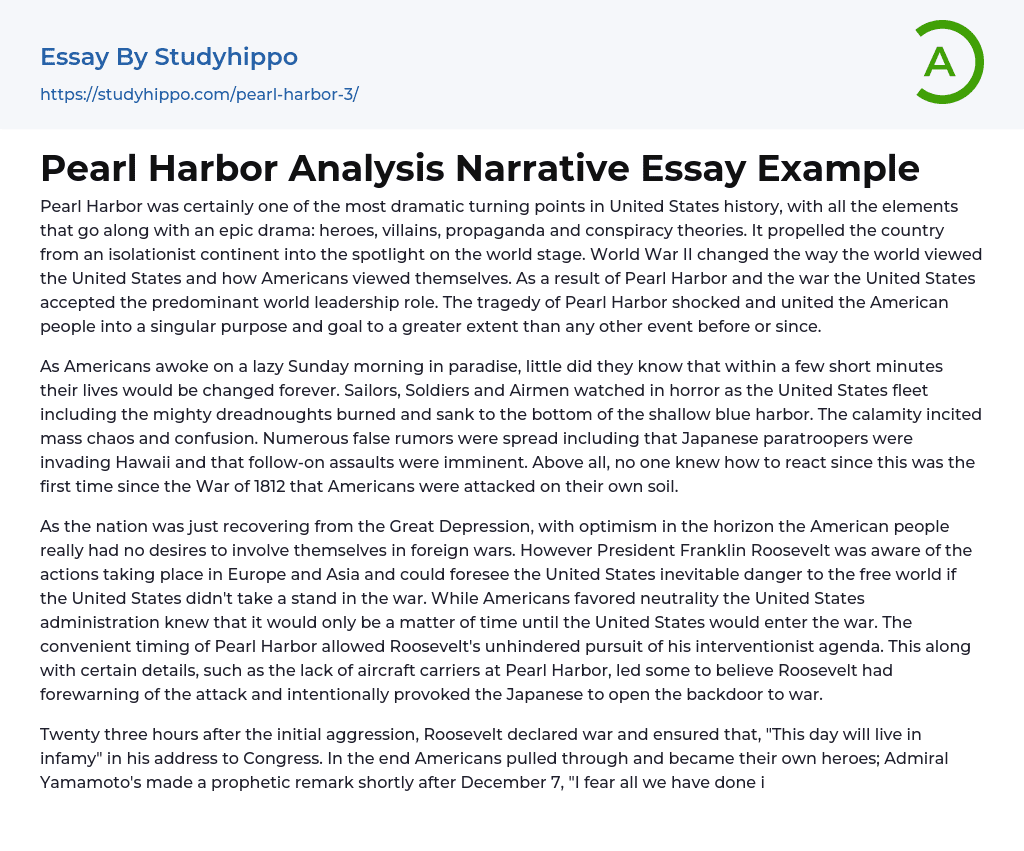The significance of Pearl Harbor in the history of the United States cannot be overstated. It represented a pivotal moment that resembled elements found in an epic drama, including heroes, villains, propaganda, and conspiracy theories. This event not only thrust the nation onto the global stage but also brought about profound changes in how both Americans perceived themselves and how they were perceived by the international community.
Following Pearl Harbor and World War II, the United States wholeheartedly embraced its prominent role on a global scale. No other event in history has had such a profound impact on uniting and galvanizing the American people towards a common purpose and objective.
On a calm Sunday morning in paradise, the lives of Americans were on the brink of an irreversible transformation. Sailors, Soldiers, and Airmen stood in shock as they witnessed the United States
...fleet, along with its mighty dreadnoughts, ablaze and sinking into the azure harbor. This tragic incident sparked widespread chaos and bewilderment. Swiftly spreading false rumors falsely asserted that Japanese paratroopers were launching an invasion on Hawaii and that further assaults would ensue. Nevertheless, what truly set this moment apart was people's unfamiliarity with how to respond; it marked America's first attack on its own soil since the War of 1812.
President Franklin Roosevelt, despite the nation's recovery from the Great Depression and optimism for the future, acknowledged the events unfolding in Europe and Asia. He understood that if the United States did not intervene in the war, it would eventually face danger. Although Americans desired neutrality, they recognized that their country would inevitably become involved in the war. The attack on Pearl Harbor provided Roosevelt with
an opportunity to freely pursue his interventionist agenda. Speculations arose suggesting that he had prior knowledge of the attack and deliberately provoked Japan into starting a war, potentially influenced by factors such as the absence of aircraft carriers at Pearl Harbor.
Twenty-three hours after the initial aggression, Roosevelt declared war and proclaimed that "This day will live in infamy" in his speech to Congress. Ultimately, Americans overcame the challenges and became heroes in their own right. Shortly after December 7, Admiral Yamamoto made a prophetic statement, "I fear all we have done is to awaken a sleeping giant and fill him with a terrible resolve." Winning World War II instilled newfound confidence in Americans and strengthened unity in the United States.
World War II was a time of great change and learning for the United States. The country experienced the harsh realities of warfare and developed into a powerful global force. It is interesting to consider what might have happened if Japan had chosen a different path on December 7, 1941.
- Air Force essays
- Army essays
- Soldiers essays
- Army Values essays
- United States Army essays
- Veteran essays
- Aircraft essays
- Sergeant essays
- World War I essays
- World War Ii essays
- Atomic Bomb essays
- American Civil War essays
- Attack essays
- Cold War essays
- Crimean War essays
- Emilio Aguinaldo essays
- Iraq War essays
- Korean War essays
- Nazism essays
- Nuclear Weapon essays
- Philippine Revolution essays
- Trench Warfare essays
- Vietnam War essays
- Western Front essays
- Diplomacy essays
- Emperor essays
- Rwanda essays
- Tribe essays
- Revolutionary War essays
- War of 1812 essays
- Mexican American War essays
- Hitler essays
- The Spanish American War essays
- League Of Nations essays
- Battle Of The Somme essays
- Treaty Of Versailles essays
- Fascism essays
- D-day essays
- Atomic Physics essays
- Atomic Bombings Of Hiroshima And Nagasaki essays
- Electron essays
- Abraham Lincoln essays
- Andrew Jackson essays
- Barack Obama essays
- Bill Clinton essays
- Donald Trump essays
- Franklin D. Roosevelt essays
- George W. Bush essays
- George Washington essays
- James Madison essays




